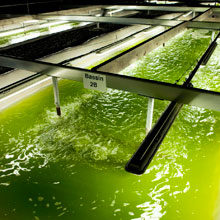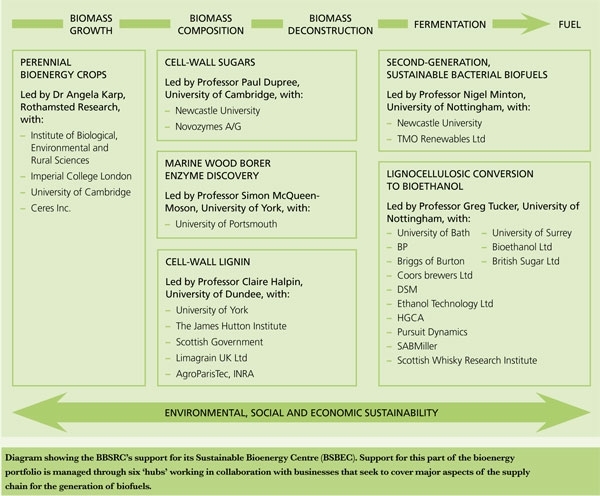Comment - The current and future funding landscape for industrial biotechnology and bioenergy research in the UK
26 November 2013

Industrial biotechnology and bioenergy (IBBE: the use of biological resources in the production of materials, chemicals and energy) is an area of great opportunity for both the UK academic and business communities.
BY COLIN MILES
The successful translation of IBBE research could help reduce fossil fuel use worldwide and promote the use of sustainable alternatives, contributing to reducing global carbon emissions. The value of products from successful translation of research could be between £4 billion and £12 billion by 2025 (BERR, 2009), contributing to increased sustainable alternatives, energy security and economic growth for the UK. As with many high technology areas, research and training activities are often the beginning of a process of innovation. In the case of IBBE, these activities will enable the conversion of a diversity of feedstocks into various products to meet current and future industrial needs. The UK is fortunate in having world-class scientists and engineers that are able to work on IBBE-relevant problems that have been identified by business when attempting to implement bioprocesses, and rapidly deliver effective solutions. Ensuring that coordination between academic and business communities occurs within this relatively new industry is clearly essential for developing opportunities and encouraging growth.
BBSRC’s role
In the UK, publicly funded research programmes are coordinated by Research Councils UK (RCUK). As one of the seven research councils supported by the Department of Business Innovation and Skills, the Biotechnology and Biological Sciences Research Council (BBSRC) is the UK government’s largest investor in non-medical life science research. Its primary role is to support research and training in UK universities and institutes, increasing the capacity and capability through funding of the UK academic community relevant to IBBE. The BBSRC has been investing in the discovery, characterisation and manipulation of a range of biological processes that include support for IBBE. Stimulating business interest, by promoting partnerships between the academic and business communities is particularly important in this area where the effective translation of basic research must proceed through collaboration with business. The BBSRC has also been actively promoting new approaches such as systems and synthetic biology to further speed up discoveries, through research council funded IBBE projects.

Current position
In terms of funding through RCUK, stimulation of the research and business communities has proceeded largely through ‘managed programmes’. Recent examples are the support for the Sustainable Bioenergy Centre (BSBEC) and the Integrated Biorefining Research and Technology Club (IBTI Club). The BSBEC was the largest single UK investment in bioenergy research (£20 million) and was coupled to an additional £4 million of business investment through six research hubs. The IBTI Club was a £6 million partnership with the Engineering and Physical Sciences Research Council (EPSRC) and ten companies sponsoring research projects in biorefining. Recently, with the growing academic and business interest in the area, ‘responsive’ mechanisms have been used to provide underpinning support that has allowed a number of large grants that are also collaborative with business, to proceed.
Increasing the capacity and capability of the UK in IBBE also serves to promote UK interests overseas, which helps attract inward investment. BBSRC and the UK Technology Strategy Board (TSB) have invested more than £5 million in two European Area Networks of Industrial Biotechnology and Bioenergy in collaboration with European partners to help further the UK’s aims. Efforts are currently being made to ensure that the EC Horizon 20/20 programme will allow UK researchers and businesses to participate and secure support relevant to the IBBE area.
A range of activities that involve public engagement in IBBE have been initiated. Early engagement through dialogue will hopefully encourage public interest in IBBE research. Engaging with the public throughout the research process will also provide a means to explore people’s hopes and concerns about the new scientific approaches that may be used to support sustained energy security. These activities include the BBSRC Bioenergy Public Dialogue.
Future funding opportunities
During the evolution of RCUK’s strategy for funding IBBE, the wide breadth of this scientific area became clear. It was important to ensure the relevant community could communicate its requirements and opportunities effectively: greater coordination of the academic and business community was required. A process of inviting networking proposals from interested groups to form community-led ‘self-assembly’ of networks was undertaken. The role of these networks is essential. They promote greater communication and understanding between the academic research and business communities involved in IBBE supply and value chains and allow new ideas and opportunities to develop through future grant proposals, both nationally and internationally.
Closely coupled to the networks has been the development of the IB Catalyst, which is being conducted in collaboration with its co-sponsor, the Technology Strategy Board (TSB). The role of the IB Catalyst, to be launched in January 2014, is to provide up to £25 million, in the first of several cycles of funding, to support the early translation of ideas emerging from the networks. This will involve collaboration between academics and business covering interests in bioscience, chemistry and engineering as well as consideration of economic, social and environmental issues. The expected outcomes of funding in this area are very positive for IBBE; including increased sustainability, energy security and economic growth for the UK.
Colin Miles
Head of Strategy, Industrial Biotechnology and Bioenergy, BBSRC
Email: [email protected]
Further reading
BERR (2009). Maximising the UK opportunities from industrial biotechnology in a low carbon economy. A report to Government from the Industrial Biotechnology Innovation and Growth team.


